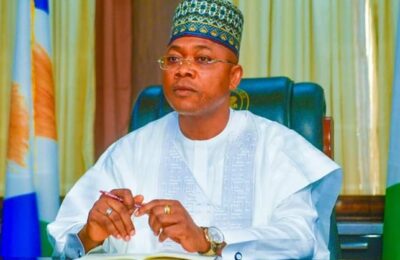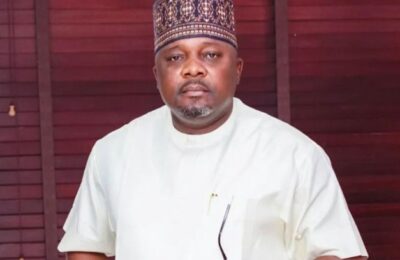Located in the industrial area of the Tin city near Plateau Water Board and Jos International Breweries, in the late 80s, and partially, 90s, the rolling mill (now Zuma Steel Company) was a beehive of activities.
With over 1,000 staff, the mill provided both social and economic succor to Jos metropolis and its surrounding. There were even staff quarters in Rayfield and Bukuru areas of the city for both senior and junior workers that coloured the landscape.
At the staff quarters this afternoon, nobody was eager to speak about the steel firm, as it was considered a Federal Government issue. However, one of the residents, who confided in The Guardian, said, “the place had crumbled.”
“The estate has been sold to a private agency and non staff are now occupying part of the quarters. They pay, accordingly, to the private person who took over the management of the quarters,” our source said.
He said there was an initial agreement between Zuma and a consortium of Ukrainian companies that bought the facility that all staff in the quarters would be paid all their entitlements to make money available for their rent. However, those still accommodated are not paying rent.
According to Jimmy Okafor, a former staff of the steel company, during its boom period, a lot of revenue were generated for government. The state equally benefitted from having such an establishment in its vicinity. However, when Federal Government began its privatisation of public assets, it was one of the companies sold.
Before the coming of Zuma Steel, Okafor said, “the company had become a shadow of itself and was completely shut down for want of what to produce. At the time Zuma took over, majority of the staff were already retrenched, leaving a few capable hands untouched, because of their vast experiences in steel production. Those who were due for pension, were placed on pension, however, their entitlements were paid in controversial circumstance after a long battle led by the Steel Workers’ Union of Nigeria, which lasted over five years. The steel rolling mill, which was taken over by Mr. Innocent Zuma-led Zuma Steel Company, however, has not fared any better.
Death Of A Steel Sector
THE deplorable situation and the pathetic neglect of the Zuma Steel Company (ZSC) is just one example of the decay in the country’s steel industry. The Guardian’s investigations have shown that if the Jos mill is in a pathetic state, then Delta Steel Company (DSC) is a metaphor for failure.
It was in 2011 that the last good story came out of the multi-billion Naira complex. Then, It was reported that the company, still produced at about 60 per cent installed capacity.
The unavailability of iron billets meant the firm had to look for alternative raw material – scrap metal – which it heavily depended on to keep producing steel. But today, DSC is no more, as the management is alleged to owe banks the sum of N31 billion, and also, several millions to its suppliers, workers and other service providers.
During the privatisation gale, the Federal Government sold 80 per cent of its equity in Delta steel, to an Indian firm, Global Infrastructure Nigeria Ltd., which initially pledged to bring in foreign investments.
The firm, instead, took a loan of over N30 billion from some Nigerian banks, which it was unable to repay. The banks had since sold the loans to Assets Management Company of Nigeria (AMCON) and that enabled AMCON to take over Delta Steel Company.
It was reported that as soon as AMCON filed its litigation on the company for non-payment of multi billion Naira debts, the company stopped meeting all its financial obligations, paying salaries; payments for goods supplied and also increased cannibalisation of the facility.
The Guardian gathered that these companies failed not because there was no market for their product, but inconsistency in government policy on steel; after all, new plants are being built across the country.
Experts, who spoke to this paper, noted that the demand for steel products in a growing economy like Nigeria’s is enormous. They said with an estimated population of over 165 million, the country has a large room and huge potential domestic market that could sustain rapid growth in the metals and related product sector.
Currently, Nigeria’s iron and steel sub-sector involves privately owned steel plants that use 100 per cent scrap metals as raw materials. There are several private foundry companies operating at low capacity, cold rolled steel mills that depend on the use of imported hot rolled coils as feed stock, showing the huge gap that exist in the nation’s steel industry.
Experts, however, believe that steel mills in Nigeria could still survive if the government invests in it and is determined to turn the sector around. They said government’s intervention via the provision of electricity, availability of raw materials, good roads, policy on ban of imported steel products and reduced interest rates on bank loans would facilitate plans to turn around the steel industry.
It was gathered that Nigeria’s need for power is almost 20,000 megawatt, as against the present 4,000 megawatts; representing just 20 per cent of what is needed to stabilise the sector.
According to industry expert, unless the steel industry is revived, unemployment problem will persist. They pointed out that the Ajaokuta Steel Company alone, if revived, could employ no fewer than 140,000 Nigerians. Logically, the other steel firms, if equally given a clean bill of health, would employ much more.
The steel sector will also grow more if the government can either stop the importation of iron rods or increase the duty on their importation. It is troubling that the nation continues to moan under the enormous burden of unemployment, but spends N500 billion yearly on steel importations.
The Minister of Solid Minerals Development, Dr. Kayode Fayemi, said a situation where yearly steel importation into the country is put at about $3.3billion is unacceptable in a country with a proven rich iron ore deposit.
The sector is yet to reach its potential, particularly, in the development and consumption of key metallic products such as, iron, steel, copper, aluminum, tin, lead, zinc and in exploitation of key noble metals like gold and silver.
A long history of failures
CONCEIVED in 1979, the Ajaokuta Steel Company, the nation’s biggest steel plant, was established to produce billets for the steel rolling mills, which, in turn, would produce steel materials such as, barbwires and rods.
It was planned as an integrated steel complex that would provide raw materials input and output to other industries; Katsina steel rolling mill, the Osogbo and Aladja. The dearth of raw materials from Ajaokuta, has, however, hampered the productivity of these rolling mills.
By the time of it’s commissioning, in 1983, the project had achieved about 95 per cent completion rate. At some point, the four mills in Ajaokuta (between 1985 and 1987) actually started optimal production, but unfortunately, local and international politics played a devastating blow to the dream that would have championed steel development in the country.
According to the Chairman, Kogi Coalition of Business and Professional Associations (KOCOBPA), Dr. John Alabi, what has been the problem of the complex is the lack of political will to get the project completed.Alabi explained that the concept of ASCL had the potential for job creation, with its own power supply and also upping the ante in foreign exchange earning.
He said now that Nigeria is trying to diversify the economy the company would have been the right catalyst to stabilize the economy by looking inwards in the line of small and medium scale enterprise.
When he assumed office in 1999, President Olusegun Obasanjo made efforts to revamp the steel plant, after what was described as an eye-opening working visit to the facility.
The Obasanjo administration, in 2001, invited TyazhPromoExport (TPE), the original builder of Ajaokuta Steel, to do a technical audit of the project and present a report on what was needed to finish and bring it back on track. Surprisingly, in 2003, Obasanjo handed over the industrial edifice to SOLGAS, a business concern that reportedly has nothing of any kind to do with engineering and mineral processing.
The Olusegun Obasanjo administration concessioned ASCO and NIOMCO (iron mining company) in 2004 and 2005, after an earlier concession pact with SOLGAS of the United States of America failed to turn around the steel facility.
To Obasanjo, the best option then was to concession the investment to Global System Steel Holdings Limited (GSHL). Though, the decision was lauded in some quarters, it was heavily criticised by steel workers and labour leaders, including, the host community, who wondered why government should give away such gigantic project to foreigners, especially, the Indians, when the people who built the place could have been given a fresher mandate and template to turn it around.
Few months after takeover, the Indian firm was accused of going against the concessional agreement, which led to a face-off between the firm and the company’s workers.
The late President Umaru Musa Yar’Adua, who set up an Interim management Committee (IMC) to oversee the steel company, eventually terminated the agreement in 2008, thereby, setting the stage for a prolonged litigation.
President Goodluck Jonathan reportedly intervened and the Federal Government regained total control of the steel company. Having given ruling in favour of Nigeria, Global Steel agreed to forfeit $1billion initially being demanded as damages allegedly suffered by the company while running the plant.
Dissatisfied with the revocation of the concession agreement by the late Yar’Adua, GSHL took the Nigerian government to the International Court of Arbitration. The case dragged until FG opted for out of court settlement in 2013, which eventually led to the latest modified concession agreement that has now paved way for the return of ASCO to the Nigerian government.
In the new arrangement, GSHL retains NIOMCO, while FG takes full control of the Ajaokuta Steel outfit. A major highpoint achieved by the government in the renewed concession agreement was a higher concession fee payable to it from 3 per cent of turnover to 4 per cent. Also, GSHL will ensure a guaranteed and continued supply of iron ore to Ajaokuta Steel Company as a priority customer. The renegotiated concession is expected to last for seven years as against the revoked one that was for a 10-year tenure.
Observers believe that the negotiated settlement is largely in the interest of the Federal Government and Nigerians, especially, considering the fact that the arbitration, which came as a result of cancellation of the original concession arrangement by the President Musa Yar’Adua administration, was proving interminable, while the plants at both Ajaokuta and Itakpe could not be utilised as was originally intended.
Also, the dispute made it impossible for government to make any long‐term plans for the concession or privatisation of NIOMCO and Ajaokuta Steel Company, just as it remained.
By accepting to release Ajaokuta to the Federal Government, a major readjustment of GSHL’s interests in Nigeria’s steel space has taken place, making the company less dominant in the sector.
Another significant feature of the negotiated agreement is that GSHL has agreed to waive all its rights to damages for any breach by the Federal Government of the earlier NIOMCO and the Ajaokuta concession agreements.In the old agreement, GSHL had a right to automatic renewal of the concession agreement, thus, giving it a concession potentially lasting 20 years. But in the renegotiated agreement, government was able to secure the agreement of a renewal of the concession upon ‘satisfactory performance’, as opposed to the old provision of ‘automatic renewal’.
Furthermore, in renewing the concession agreement, the Federal Government would be able to renegotiate its commercial terms. This is very much unlike the position that obtained under the old agreement.
By some measures, the recent decision by government to renegotiate the concession agreement has freed the Ajaokuta Steel Complex from all the legal and contractual encumbrances, giving way for its revitalization. But a clean legal state, however, does not mean that all is well with the steel company.
Salient issues of technical competence are still glossed over. Even now, it is still not entirely clear what the new templates are in terms of restructuring and putting in place a sound technology.
Some stakeholders appear to be uncomfortable with the arrangement. While some believe that government should hand over the Ajaokuta plant to the Russian company that built it, others want it to stick to its plan to subject the company to a competitive bid and ensure that only the most credible organisation with proven technical ability and financial plan gets the nod.
The BPE, through its acting Director-General, Mr. Vincent Akpotaire, said it had not been fully involved in the privatisation of NIOMCO and Ajaokuta since 2004. “The way forward is perhaps to unbundle the various plant lines in Ajaokuta, which can all stand independently on their own as against going for a single core investor again,” he stated.
Akpotaire also said records indicated that NIOMCO and Delta Steel did not find their feet after the first privatisation in 2004 because the GIHL “clearly lacked the capacity” to deliver.
The deal, no doubt, raises fresh challenge of funding. It has added heavier fiscal weight on public expenditure; therefore, the 2017 budget must capture the steel company.
Workers of the steel firms and members of the host communities are opposed to the latest agreement on account of unresolved issues; one of which was the non-payment of outstanding benefits.
Others were calls for the payment of compensation for lives lost in the host communities during the various protests staged by their youths to oppose the privatisation policy.
The Minister of State for Solid Minerals Development, Mr. Abubakar Bawa-Bwari, said recently that the Federal Government had spent over $10bn on the Ajaokuta Steel Company in the last 35 years.
If there are ground to jubilate the recent agreement, there are doubts about what GSHL has done in the country’s steel industry since it started its octopi hold. Many still believe that there was no real willingness to shoulder responsibility in the failed Nigerian steel project.
What are the reasons for the failure to turnaround the place? Part of the criticism against Ajaokuta is that its machines are ‘obsolete’ in addition to having an ‘outdated Blast Furnace’ model of steel production plant.
The ministry, however, insisted that it opted for the best option in its deal with GSHL. Citing the accrued advantages to the Federal Government, who in turn retook Ajaokuta and the fact that the mediation process was at no cost to government.
Bwari also pointed out the fact that without the mediation process, the two national assets would remain in ruins, while government continued to pay salaries of workers without anything to show for it.
Apparently unable to undo the process, the House committee, however, urged the ministry to ensure that the Bureau of Public Enterprises (BPE) is carried along in subsequent arrangement.
But many stakeholders, including the President of Nigerian Mining and Geosciences Society (NMGS), Prof Gbenga Okunlola, believe the government is on the right track in its decision to retake Ajaokuta and cede NIOMCO to GSHL.
Okunlola said with guaranteed supply of iron ore from NIOMCO, Ajaokuta would become functional and Nigeria can utilise it to kick-start its industrialisation plans.
The GSHL Chairman, Pramod Mittal, said the company waited for eight years to achieve this amicable settlement.He said his firm was committed to the objectives of the agreement and guaranteed supply to Ajaokuta plant and Delta Steel Company, after which it would sell what is left to other interested parties.




